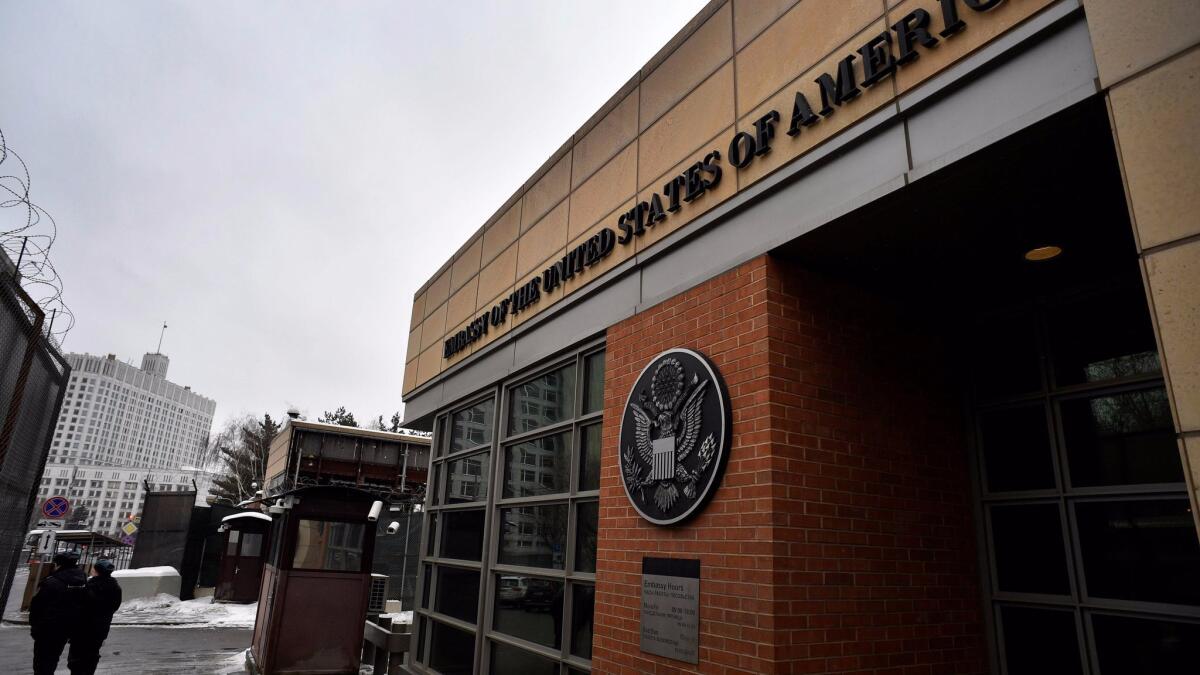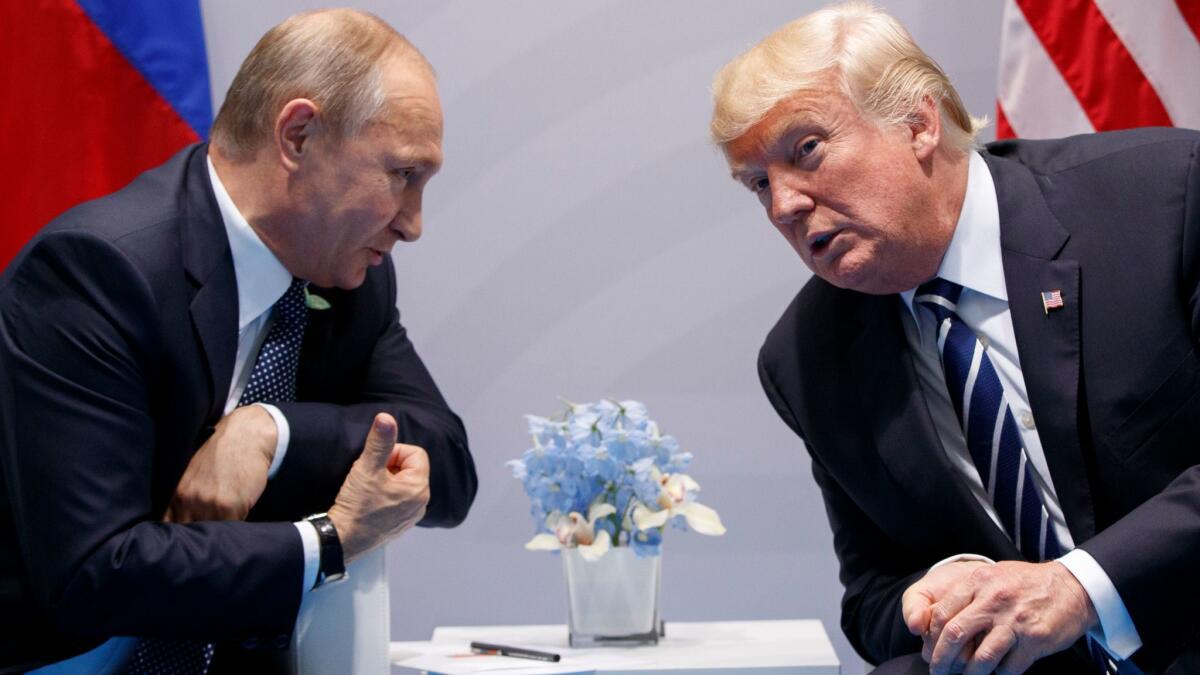Putin announces cut of 755 U.S. diplomatic staff in Russia, stepping up confrontation over sanctions

The United States must cut 755 of its diplomatic staff in Russia. (July 31, 2017)
- Share via
Reporting from Washington — Touching off the Kremlin’s most serious diplomatic confrontation with Washington since President Trump took office six months ago, President Vladimir Putin announced Sunday that the United States would have to cut its embassy and consulate staff by 755 — by far the biggest such forced reduction in years — in response to a package of sanctions awaiting Trump’s signature.
“I decided it’s time for us to show we do not intend to leave U.S. actions unanswered,” the Russian leader said in remarks aired in a prime-time evening interview on “Vesti,” a program on Russia’s Channel One.
For the record:
1:00 p.m. July 30, 2017An earlier version of this article said that Putin was expelling 775 U.S. diplomats. The correct number is 755.
The announcement marks a dizzying new turn in the relationship between Putin and President Trump, whose interactions for months had appeared to be both courtship ritual and testing ground.
The cuts to American and local diplomatic positions, to take effect Sept. 1, would reduce the number of U.S. diplomatic staff in Russia to 455, the same number that Russia has in the United States.
Putin fueled confusion by using the verb for “pack up” in referring to the personnel cuts he ordered, leading to initial reports in Russia that the entire number of reductions he cited were to be expulsions. “More than 1,000 employees, diplomats and technical workers … continue to work today in Russia,” he said, according to the Interfax news agency. “Seven hundred and fifty-five will have to stop this activity.”
In addition to the embassy in Moscow, the U.S. maintains consulates in St. Petersburg, Vladivostok and Yekaterinburg. His directive provided no breakdown of the numbers of U.S. personnel to be expelled and non-American staff to be dismissed, nor has the State Department issued any statement clarifying who would be affected.
A former U.S. ambassador to Russia, Michael McFaul, tweeted that the number exceeds the total number of American diplomats in the country.
After the sanctions bill won Senate approval last week, the Kremlin had indicated that some expulsions were in the offing, and the Foreign Ministry said Friday that the number of U.S. personnel should be reduced to 455. Putin’s announcement formalized that — and marked a huge escalation in terms of the usual diplomatic tit for tat.
By contrast, only 35 Russians were expelled by President Obama shortly before he left office — and most of those were specifically singled out on suspicion of links to spying.
The Foreign Ministry had also said it seized two American diplomatic properties, including cottages just outside Moscow’s city center and a warehouse facility in Moscow.

Even during the days of the Cold War, retaliatory expulsions numbered in the dozens rather than hundreds, such as when the Reagan administration ordered out 55 then-Soviet diplomatic personnel in 1986.
Before Putin’s announcement, the White House had indicated that Trump will sign the sanctions bill, even though the president has for months expressed uncertainty over Russia’s involvement in what U.S. intelligence agencies have described as a concerted campaign of Kremlin interference meant to throw the election to Trump.
Trump held his first face-to-face meeting as president with Putin in July on the sidelines of a Group of 20 summit in Germany — an encounter in which critics said Trump failed to forcefully confront the Russian leader over election meddling.
At the same summit, Trump engaged in an unscripted private chat with Putin while both were attending a large dinner for leaders and their spouses — an encounter that shocked policy mavens, who said the president’s failure to have any U.S. representative privy to the conversation, even an interpreter, had been a perilous choice.
In a sense, Sunday’s announced retaliation by the Kremlin brings U.S.-Russia ties full circle from the Obama-ordered expulsions back in December. Trump, then president-elect, had praised Putin at the time for not responding in kind to those. It eventually emerged that Trump’s short-lived national security advisor, Michael Flynn, had discussed the sanctions issue with Russia’s then-ambassador to Washington, Sergey Kislyak. Flynn was fired after just 24 days on the job.
Both Trump’s White House and the State Department were silent in the hours following Putin’s declaration. A day earlier, the State Department had elicited puzzlement when it described the U.S. sanctions as a bid to improve ties with Moscow. After Putin’s announcement, the U.S. Embassy in Moscow issued a brief statement expressing disappointment.
Putin’s comments came hours after a senior Russian envoy had hinted at additional retaliation for an “unacceptable” U.S. sanctions measure overwhelmingly approved last week by the Senate, following a similarly lopsided endorsement by the House of Representatives.
In an interview aired in the U.S. shortly before Putin spoke on Russian TV, Deputy Foreign Minister Sergei Ryabkov had sharply denounced the sanctions bill, calling it “unacceptable” and “the last straw.”
“This retaliation is long, long overdue,” the envoy said on ABC’s “This Week.”
Trump, who was at his Virginia golf course as the diplomatic confrontation erupted, has repeatedly called multiple investigations as to whether Russia colluded with his campaign a “witch hunt.” Ryabkov used similar language to describe the probes.

“The very fact that someone saw some Russian or Russians somewhere is now close to a criminal act — I think it’s ridiculous,” he said in the ABC interview. “It’s degrading for such a great country as the United States.”
Although he repeated a blanket denial of Kremlin involvement in the election, Ryabkov did not directly address a question as to whether Moscow had given the Trump camp illegally obtained information that was detrimental to Hillary Clinton, Trump’s opponent.
“All the information we provide to anyone can be easily found in open sources,” he said.
Even while announcing the expulsions and staff cuts, the Russian president said there were still areas where Washington and Moscow could cooperate, including counter-terrorism.
The latest round of internal turbulence at the White House carries potential repercussions for the Russia investigations being carried out by special counsel Robert Mueller, the FBI and Congress. Trump is replacing his ousted chief of staff, Reince Priebus, with Secretary of Homeland Security John F. Kelly, a retired Marine Corps general.
That gave rise to immediate speculation that the president might try to appoint Atty. Gen. Jeff Sessions, who has recused himself from Russia-related matters, as Kelly’s replacement. Such a step would theoretically leave Trump free to appoint a new attorney general who would be empowered to oversee the Russia probe, including the ability to fire the special counsel.
Sessions recused himself this year after it emerged that he had failed to report contacts with Russia’s ambassador to the United States while advising the Trump campaign. Over the last week, Trump has repeatedly attacked the attorney general on Twitter for his recusal, in what was widely viewed as an attempt to push Sessions into resigning.
Lawmakers from both sides of the aisle have signaled that any move to sideline Sessions — either by firing him or seeking to transfer him to a new post — would be regarded with suspicion. More such warnings came Sunday.
Any move to fill Kelly’s job with the attorney general is “up to Jeff Sessions and the president,” said Sen. Susan Collins (R-Maine), interviewed on NBC’s “Meet the Press.” But she added that if Trump acted because of Sessions’ “correct decision to recuse himself, I think that’s a mistake.”
Sen. Dianne Feinstein (D-Calif.), declared on CBS’ “Face the Nation” that any move against Mueller would probably backfire badly. Feinstein said that if Trump tried to fire the special counsel, it “could well be the beginning of the end of his presidency.”
The Trump administration had fought to prevent the sanctions bill’s passage, but the president was seen as having little choice but to sign it because the Russia investigations have reached deeper into the White House and touched members of his family. He could veto the measure, but because the bill passed by such large margins, Congress could then override him.
ALSO
His frustrations public, Tillerson tries to tamp down resignation speculation
U.S. elections are an easier target for Russian hackers than once thought
Staff writer King reported from Washington and special correspondent Ayres from London.
UPDATES:
5:20 p.m.: This article has been updated with explanation of reductions, further background.
1:05 p.m.: This article has been updated with date that expulsions are to take effect, plus background and analysis.
This article was originally posted at 12:25 p.m.
More to Read
Sign up for Essential California
The most important California stories and recommendations in your inbox every morning.
You may occasionally receive promotional content from the Los Angeles Times.









